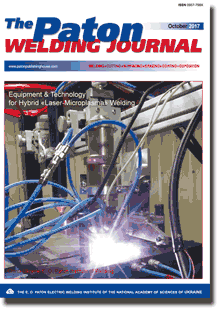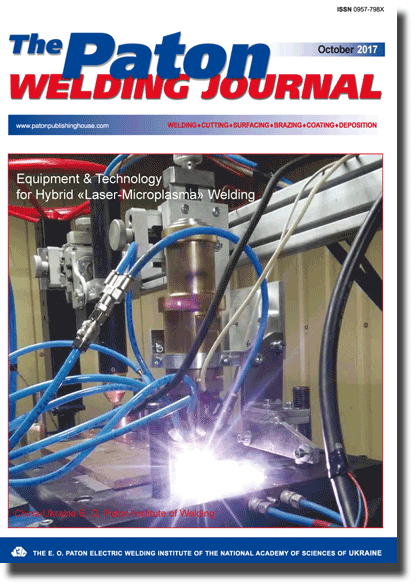| 2017 №10 (08) |
DOI of Article 10.15407/tpwj2017.10.01 |
2017 №10 (02) |

The Paton Welding Journal, 2017, #10, 2-8 pages
Peculiarities of formation of structure in welded joints of microalloyed structural steel S460M
G.M. Grigorenko, V.D. Poznyakov, T.A. Zuber and V.A. Kostin
E.O. Paton Electric Welding Institute of the NAS of Ukraine 11 Kazimir Malevich Str., 03150, Kiev, Ukraine. E-mail: office@paton.kiev.ua
Abstract
Structural steels of C440 strength class and higher have found a wide application in high-rise construction, bridge construction and freight rail transport. Application of steel roll stock with yield limit of 440 MPa allows reducing specific amount of metal per structure by 39 % in comparison with steel of St3sp (killed) (C275) grade and by 26 % in comparison with 09G2S (C345) steel grade. Present work examines the peculiarities of formation of structure in the welded joints of structural steel S460M. A CCT diagram of austenite decay in steel S460M was plotted. Effect of cooling rate of HAZ metal sample simulator on structure and strength properties was determined. It is shown that heat treatment of welded joints of steel S460M (thermal cycling, i.e. heating to 1200 °C with 25 °C/s rate plus annealing at 950 °C during 1 h plus air cooling) provides formation in HAZ metal of a favorable complex of ferrite-bainite structures due to decrease of banded structures, reduction of portion of Widmanstatten ferrite and pearlite. 8 Ref. 2 Tables, 7 Figures.
Keywords: high-strength steel, welding thermal cycle, microstructure, acicular ferrite, cooling rate, CCT diagram of austenite decay
Received: 16.06.17
Published: 13.11.17
References
- Odessky, P.D., Molodtsov, A.F., Morozov, Yu.D. (2011) New efficient low-alloy steels for building metal structures. Montazhnye i Spetsialnye Raboty v Stroitelstve, 5, 20–25 [in Russian].
- Bolshakov, V.I., Laukhin, D.V., Beketov, A.V. (2008) Use of low-carbon high-strength steels in metal structures of the carcass superstructure of five-storey residential buildings. In: Material sciences. Mechanical engineering. Series: Innovative technologies for the life cycles of civil, industrial and transport facilities, Vol. 47, 103–108 [in Russian].
- Hot-rolled structural steel S460M /ML DSTU EN 10025-4:2007. Thermomechanical treated fine-grain welded steel. www.metinvestholding.com [in Russian].
- BS EN 10025:4:2004: Hot-rolled products of structural steels. Pt 4: Technical delivery conditions for thermomechanical rolled weldable fine- grain structural steels [in Russian].
- Poznyakov, V.D., Zhdanov, S.L., Zavdoveev, A.V. et al. (2016) Weldability of high-strength microalloyed steel S460M. The Paton Welding J., 12, 21–28. https://doi.org/10.15407/tpwj2016.12.04
- Guenter, H.P., Hildebrand, J., Rasche, C. et al. (2012) Welded connections of high-strength steels for the building industry. Welding in theWorld, 5–6, 86–106. https://doi.org/10.1007/BF03321353
- Grigorenko, G.M., Kostin, V.A., Orlovsky, V.Yu. (2008) Current capabilities of simulation of austenite transformations in low-alloyed steel welds. The Paton Welding J., 3, 22–24 [in Russian].
- Kostin, V.A., Grigorenko, G.M., Zhukov, V.V. (2013) Features of the structure formation in the welding of high-strength steels with carbonitride hardening. Visnyk NUK im. Adm. Makarova, 1, 34–41 [in Russian].
Suggested Citation
G.M. Grigorenko, V.D. Poznyakov, T.A. Zuber and V.A. Kostin (2017) Peculiarities of formation of structure in welded joints of microalloyed structural steel S460M. The Paton Welding J., 10, 2-8.The cost of subscription/purchase order journals or individual articles
| Journal/Currency | Annual Set | 1 issue printed |
1 issue |
one article |
| TPWJ/USD | 384 $ | 32 $ | 26 $ | 13 $ |
| TPWJ/EUR | 348 € | 29 € | 24 € | 12 € |
| TPWJ/UAH | 7200 UAH | 600 UAH | 600 UAH | 280 UAH |
| AS/UAH | 1800 UAH | 300 UAH | 300 UAH | 150 UAH |
| AS/USD | 192 $ | 32 $ | 26 $ | 13 $ |
| AS/EUR | 180 € | 30 € | 25 € | 12 € |
| SEM/UAH | 1200 UAH | 300 UAH | 300 UAH | 150 UAH |
| SEM/USD | 128 $ | 32 $ | 26 $ | 13 $ |
| SEM/EUR | 120 € | 30 € | 25 € | 12 € |
| TDNK/UAH | 1200 UAH | 300 UAH | 300 UAH | 150 UAH |
| TDNK/USD | 128 $ | 32 $ | 26 $ | 13 $ |
| TDNK/EUR | 120 € | 30 € | 25 € | 15 € |
AS = «Automatic Welding» - 6 issues per year;
TPWJ = «PATON WELDING JOURNAL» - 12 issues per year;
SEM = «Electrometallurgy Today» - 4 issues per year;
TDNK = «Technical Diagnostics and Non-Destructive Testing» - 4 issues per year.


